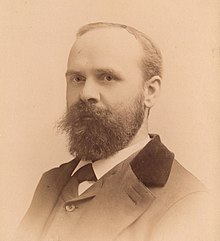
Back بنجامين تاكر Arabic بنجامين تاكر ARZ Benjamin Tucker AST بنجامین تاکر AZB Бенджамин Тъкър Bulgarian Benjamin Tucker Catalan Benjamin Tucker Czech Benjamin Tucker German Benjamin Tucker EO Benjamin Tucker Spanish
This article contains too many or overly lengthy quotations. (January 2024) |
Benjamin Tucker | |
|---|---|
 | |
| Born | Benjamin Ricketson Tucker April 17, 1854 South Dartmouth, Massachusetts, United States |
| Died | June 22, 1939 (aged 85) |
| Occupation(s) | Editor, publisher, writer |
| Era | Modern philosophy |
| Region | Western philosophy |
| School | Individualist anarchism Libertarian socialism Mutualism |
Main interests | Politics, economics |
| Signature | |
| This article is part of a series on |
| Anarchism in the United States |
|---|
 |
Benjamin Ricketson Tucker (/ˈtʌkər/; April 17, 1854 – June 22, 1939) was an American individualist anarchist.[1][2][3] Tucker was the editor and publisher of the American individualist anarchist periodical Liberty (1881–1908). Tucker described his form of anarchism as "consistent Manchesterism" and stated that "the Anarchists are simply unterrified Jeffersonian Democrats."[4][5]
Tucker looked upon anarchism as a part of the broader socialist movement.[6] Tucker harshly opposed state socialism and was a supporter of free-market socialism and libertarian socialism which he termed anarchist or anarchistic socialism[7][8] as well as a follower of mutualism.[9] He connected the classical economics of Adam Smith and the Ricardian socialists as well as that of Josiah Warren, Karl Marx and Pierre-Joseph Proudhon to socialism.[2][10][11] Later in his life, Tucker converted to Max Stirner's egoism.[12] Some modern commentators have described Tucker as an anarcho-capitalist,[13][14] although this has been disputed by others,[15][16] as well as by some anarcho-capitalists who state the differences between their ideology and individualist anarchism.[17] During his lifetime, Tucker opposed capitalism[18] and considered himself a socialist due to his belief in the labor theory of value and disputed many of the dictionary definitions of the term which he believed were inaccurate.[19][20]
- ^ McKay, Iain. "An Anarchist FAQ." Oakland. AK Press. 2008. pp 22
- ^ a b Martin, James J. (1953). Men Against the State: The Expositers of Individualist Anarchism in America, 1827–1908. "Benjamin R. Tucker and the Age of Liberty I". Auburn: Mises Institute. pp. 202–233. ISBN 9781610163910.
- ^ Johnson, Charles (26 August 2015). "Benjamin Tucker on Anarcho-Capitalism". Center for a Stateless Society. Retrieved 2022-06-27.
[...] or identify anarcho-capitalism as a close relation of the free-market individualist anarchism of Benjamin Tucker, Lysander Spooner, Victor Yarros, et al.
- ^ Tucker, "Should Labor be Paid or Not?", in Instead of a Book.
- ^ Tucker, "State Socialism and Anarchism", in Instead of a Book; see also McCarthy, Daniel (January 1, 2010) A Fistful of Dynamite Archived 2011-05-18 at the Wayback Machine, The American Conservative.
- ^ Martin, James J. Men Against the State. Ralph Myles Publisher Inc.: Colorado. 1970. pp. 226-227.
- ^ Benjamin Tucker. "Socialism: What It Is". Fair Use Repository.
- ^ Chartier, Gary. Anarchy and Legal Order. Cambridge University Press: New York. 2013. pp. 399.
- ^ Martin, James J. Men Against the State. Ralph Myles Publisher Inc.: Colorado. 1970. pp. 226.
- ^ Tucker, Benjamin. Instead of a Book. Alpha Editions. 2019. pp 10
- ^ Chartier, Gary. Anarchy and Legal Order. Cambridge University Press: New York. 2013. pp. 401.
- ^ Martin, James J. (1953). Men Against the State: The Expositers of Individualist Anarchism in America, 1827–1908. "Benjamin R. Tucker and the Age of Liberty II". Auburn: Mises Institute. pp. 234–278. ISBN 9781610163910.
- ^ Freeden, Michael; Sargent, Lyman Tower; Stears, Marc (2013-08-15). The Oxford Handbook of Political Ideologies. Oxford: Oxford University Press. p. 388. ISBN 978-0-19-958597-7.
- ^ Curran, G. (2006-10-31). 21st Century Dissent: Anarchism, Anti-Globalization and Environmentalism. Springer. p. 21. ISBN 978-0-230-80084-7.
- ^ McKay, Iain. An Anarchist FAQ. AK Press. Oakland. 2008. pp 23, 526.
- ^ Chartier, Gary. Anarchy and Legal Order. Cambridge University Press: New York. 2013. pp. 402-403.
- ^ Rothbard, Murray. "Are Libertarians 'Anarchists'?". Lew Rockwell.com. Retrieved 30, June 2022.
- ^ Chartier, Gary. Anarchy and Legal Order. Cambridge University Press: New York. 2013. pp. 403.
- ^ Tucker, Benjamin. Instead of a Book. Alpha Editions. 2019. pp 364-365.
- ^ Chartier, Gary. Anarchy and Legal Order. Cambridge University Press: New York. 2013. pp. 400 fn 32.